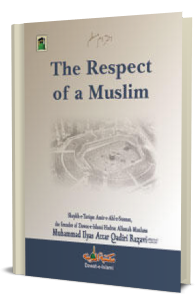
The Beloved Prophet صَلَّى اللّٰهُ عَلَيْهِ وَاٰلِهٖ وَسَلَّم has said: ‘لاَ يُؤْمِنُ أَحَدُكُمْ، حَتَّى يُحِبَّ لِأَخِيهِ مَا يُحِبُّ لِنَفْسِهِ’ i.e. No one amongst you can become a believer until he likes for his brother the same as he likes for himself. (Bukhari, vol. 1, pp. 16, Hadees 13)
Regarding this blessed Hadees, Islamic scholars and great Muhaddiseen have mentioned many such matters of which a Muslim should take care equally for himself and for other Muslim brother. Regarding this blessed Hadees, Mufti Ahmad Yar Khan Na’eemi رَحْمَةُ الـلّٰـهِ عَـلَيْه has said, ‘Keep in mind that here it means ‘goodness’. You should desire to have goodness of the world and the Hereafter for every Muslim in the same way as you desire for yourself. There are different forms of this goodness. For example, for some people wealth is goodness and for some poverty, for some people seclusion is goodness and for some socialization, therefore if the Muslim who is in seclusion wants socialization for the other Muslim for whom socialization is better, it is not contrary to this blessed Hadees.’ (Mirat-ul-Manajeeh, vol. 6, pp. 555)
Imam Muhammad Bin Abd-ud- Da’im Shaafi’i رَحْمَةُ الـلّٰـهِ عَـلَيْه has written, ‘It is the requirement of the Iman that a believer should keep his brother safe from evils. If he feels that he is facing more troubles and problems, and considers the troubles of the other Muslim brother to be less or prefers to obtain goodness for himself rather than others, his Iman is not perfect.’ (Al-Laami’-us-Sabeeh, vol. 1, pp. 143)
Sharih-e-Bukhari Mufti Sharif-ul-Haq Amjadi رَحْمَةُ الـلّٰـهِ عَـلَيْه has said: Perfect believer is he who likes for his Muslim brother the same as for himself. It is compulsory for him to dislike the thing for others what he dislikes for himself, i.e. a person wants to live happily with respect. He does not want anyone to insult and humiliate him, and nor does he want anyone to cause inconvenience to him. He wants no one to deprive him of his rights. Similarly, he should desire to have the same for the other Muslim brother i.e. my brother should live happily with respect. Neither should he be insulted and humiliated nor should he be deprived of his rights. From this it has surely become clear that if every person forms this habit, the society will become good and civilized and people will live peacefully and comfortably. Obviously, the root cause of any quarrel is that a human stingily desires to get everything for himself, and wants others to be deprived of them. This blessed Hadees teaches us how to exercise civility, encourage cooperation, offer mutual help and treat others well. From this blessed Hadees, we can also learn in an extremely interesting manner how to refrain from jealousy, malice, hatred, animosity, causing inconvenience (to others), depriving someone of their rights, and the desire to become superior to other people. For this reason, Islamic scholars have considered it to be one of ‘جَوَامِعُ الْکَلِمْ and اُمُّ الْاَحَادِیْث’. (Nuzhat-ul-Qaari, vol. 1, pp. 315)
Keep in mind that there are some acts which have been declared to be the signs of Islam or Islam in many blessed Ahadees. For example, it has been said: Feeding (people) food is Islam. Muslim is he from whose tongue and hand another Muslim remains safe, etc. These blessed Ahadees do not mean that the Muslim who only possesses the attribute of feeding (people) food is a perfect believer, though he does not perform the remaining deeds and (does not) act upon the fundamentals of Islam regularly. Similarly, these blessed Ahadees do not mean that only this one act is Islamic, and the remaining deeds and the fundamentals of Islam are unnecessary. The Beloved Prophet’s purpose of mentioning an act with great emphasis is to attach importance to that act. (Fayd-ul-Baari, vol. 1, pp. 187)
May we think positively and do well for ourselves and for our Muslim brothers.

















Comments